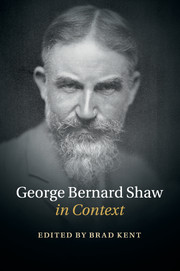Book contents
- Frontmatter
- Dedication
- Contents
- List of illustrations
- Notes on contributors
- Preface
- Acknowledgements
- A Chronology of Shaw's Works
- List of abbreviations
- PART I PEOPLE AND PLACES
- PART II THEATRE
- PART III WRITING AND THE ARTS
- PART IV POLITICS
- PART V CULTURE AND SOCIETY
- 31 Celebrity
- 32 Education
- 33 Evolutionary theory
- 34 Health and vegetarianism
- 35 Language
- 36 Nature
- 37 Philosophy
- PART VI RECEPTION AND AFTERLIFE
- Further reading
- Index
- References
33 - Evolutionary theory
from PART V - CULTURE AND SOCIETY
Published online by Cambridge University Press: 05 October 2015
- Frontmatter
- Dedication
- Contents
- List of illustrations
- Notes on contributors
- Preface
- Acknowledgements
- A Chronology of Shaw's Works
- List of abbreviations
- PART I PEOPLE AND PLACES
- PART II THEATRE
- PART III WRITING AND THE ARTS
- PART IV POLITICS
- PART V CULTURE AND SOCIETY
- 31 Celebrity
- 32 Education
- 33 Evolutionary theory
- 34 Health and vegetarianism
- 35 Language
- 36 Nature
- 37 Philosophy
- PART VI RECEPTION AND AFTERLIFE
- Further reading
- Index
- References
Summary
Born in 1856, just before Darwin's Origin of Species (1859) and The Descent of Man, and Selection in Relation to Sex (1871) appeared, Shaw ‘at sixteen … was “up to his neck in Darwin”’. Few fields apprehend the connection of science to religion, art, and politics more so than that of evolutionary theory. Evolution, the most intellectually elegant of all the genesis narratives, became the founding trope for Shaw's ideas and beliefs about mankind. An account of his theory warrants some grounding in both the history of the epistemology of science and also of the idea of evolution over the seventy-five years of his adult lifetime. Moreover, Shaw's evolutionism is not finally intelligible unless one sees it as a retrospect of the later development of evolutionary theory that followed his death. Fortunately, now practically complete is Peter J. Bowler's magisterial account of evolutionary theory, which recognises some of the importance of Shaw in its history.
Shaw would combine the conservative scientific narrative of Darwinian evolution with the non-Darwinian meliorism of Lamarckian theory. He was not a positivist, an empiricist, nor a determinist. He was a thinker, a playwright, and a secular prophet ordained by public celebrity. Shaw's combination produced a teleology – a semi-scientific proto-narrative of an origin and evolving moral maturity of mankind through brutal struggle, which he refined, especially in his plays and their prefaces, throughout his life. At the same time, thanks to the success of Thomas Henry Huxley, Darwin's ‘Bulldog’, Darwin's natural selection theory, although challenged, became solidly established in the lexicon of professional British science by the end of the nineteenth century.
In ‘Darwin Denounced’, his 31 May 1887 Pall Mall Gazette review of Samuel Butler's Luck, or Cunning, as the Main Means of Organic Modification?, Shaw applauded Butler's repudiation of nihilistic Neo-Darwinism. Human government required the hope found in a religion. Shaw's evolutionism envisioned the as yet, itself, not fully emerged Life Force joining mankind, or some other candidate species, in a gradual physical, intellectual, and moral transformation to a perfection of existence – pure thought.
In 1916 Shaw called his religion ‘Creative Evolution’, with roguishly preemptive credit to an angry Henri Bergson, who had published a book with this title in 1907. Shaw's aspiration for man, though achieved by voluntary struggle and endurance of pain, is mystical, pantheistic, and generous.
- Type
- Chapter
- Information
- George Bernard Shaw in Context , pp. 273 - 280Publisher: Cambridge University PressPrint publication year: 2015



